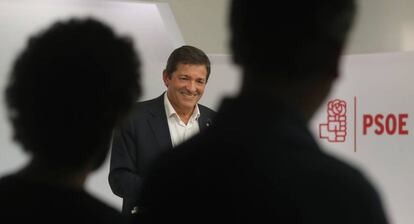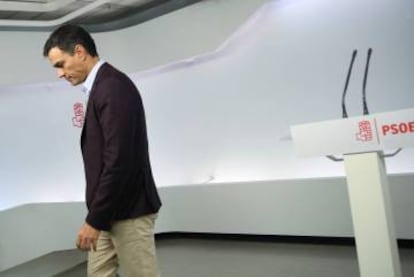Rajoy denies he will demand conditions for Socialist support
PSOE leaders, already struggling to put their party back together, accuse Popular Party of moving the goalposts

With Spain in a political stalemate for the last 10 months, the Socialist Party (PSOE) is inching closer to an internal agreement that would allow acting Prime Minister Mariano Rajoy of the Popular Party (PP) to form a minority government.
On Tuesday, only three out of the 26 Socialist deputies who spoke at a meeting insisted on a categorical “no” to a PP administration. The remainder agreed that the priority is avoiding a third back-to-back election in Spain that could very well yield a similarly fragmented scenario as the previous two.
The grassroots are angry and the division within different groups is very deep
PSOE regional leader
While the idea of helping Rajoy into office by abstaining at an investiture session is unprecedented and has already created huge fracture lines within the PSOE, even this might not be enough to save Spaniards from going to the polls again.
Moving the goalposts
Some PP leaders are saying they will not accept just a “technical or strategic” abstention from the Socialists, only to watch the latter block every government initiative from the opposition benches.
Conservative leaders have suggested that a Socialist abstention might be nothing more than delaying tactics while the PSOE pulls itself together following last weekend’s debacle, when its secretary general Pedro Sánchez resigned over his handling of the political impasse. According to this theory, the PSOE might later push for a no-confidence vote and force new elections some time next year.

“We must have the possibility of bringing forward legislation that we can agree on if they want to,” said Rafael Hernando, the PP’s spokesman in Congress. “An abstention cannot simply be a strategic move, it has to be useful to the country. And usefulness is not a government that lasts one day, but is instead one that can actually govern.”
“Our fear, even after a likely PSOE abstention, is that there will be a short, impossible term of office during which we’ll be unable to get anything done and which will be doomed to permanent failure, and serve only as a step forward towards the inevitable,” said one trusted Rajoy aide, alluding to new general elections.
Rajoy speaks out
Faced with Socialist outrage over these statements, on Thursday Rajoy himself sent out a reassuring message.
“I will not set out conditions for the PSOE to negotiate the investiture,” he said up to three times at a public event in Málaga. “The urgent thing, the reasonable and sensible thing is for there to be a government, and this is not about making demands on anyone.”
Rajoy did express a preference for “a government that will bring stability, security and assurance,” and noted that he has personally been pushing for a grand PP-PSOE coalition since the original election of December 20.
“If this is not possible, then we are ready to consider any possibility because forming a government is the priority,” he added. “An abstention would be enough to get the budget passed: all that’s required is more votes in favor than against.”
Rajoy sent out a final message to the Socialists: “Reaching consensus is not a defeat, it is a victory for everyone.”
Increasingly concerned
Spaniards’ concern about the lack of government has grown more than five percentage points, from 6.4% in July to 11.6% in September, according to data released on Wednesday by the Center for Sociology Research (CIS).
Meanwhile, the management team that temporarily took over from Pedro Sánchez last weekend is working around the clock to try to mend the party’s internal wounds while conveying the urgent need to decide on a strategy before time runs out and King Felipe, the head of state, is forced to dissolve parliament and call new elections.
While it is now unofficially believed that many party officials favor an abstention – although nobody has as yet said so – convincing the party will be a major challenge.
“The grassroots are angry and the division within different groups is very deep,” said one regional leader.
Senior Socialist officials accuse the PP of moving the goalposts on Wednesday by demanding not just an abstention at the investiture vote, but also a pledge not to block the government on key issues in the coming years.
“The PP is in no position to set conditions for anyone,” said Mario Jiménez, the PSOE management team’s organization secretary, adding: “The PP has been unable to form a majority in Congress.”
English version by Susana Urra.
Tu suscripción se está usando en otro dispositivo
¿Quieres añadir otro usuario a tu suscripción?
Si continúas leyendo en este dispositivo, no se podrá leer en el otro.
FlechaTu suscripción se está usando en otro dispositivo y solo puedes acceder a EL PAÍS desde un dispositivo a la vez.
Si quieres compartir tu cuenta, cambia tu suscripción a la modalidad Premium, así podrás añadir otro usuario. Cada uno accederá con su propia cuenta de email, lo que os permitirá personalizar vuestra experiencia en EL PAÍS.
¿Tienes una suscripción de empresa? Accede aquí para contratar más cuentas.
En el caso de no saber quién está usando tu cuenta, te recomendamos cambiar tu contraseña aquí.
Si decides continuar compartiendo tu cuenta, este mensaje se mostrará en tu dispositivo y en el de la otra persona que está usando tu cuenta de forma indefinida, afectando a tu experiencia de lectura. Puedes consultar aquí los términos y condiciones de la suscripción digital.








































